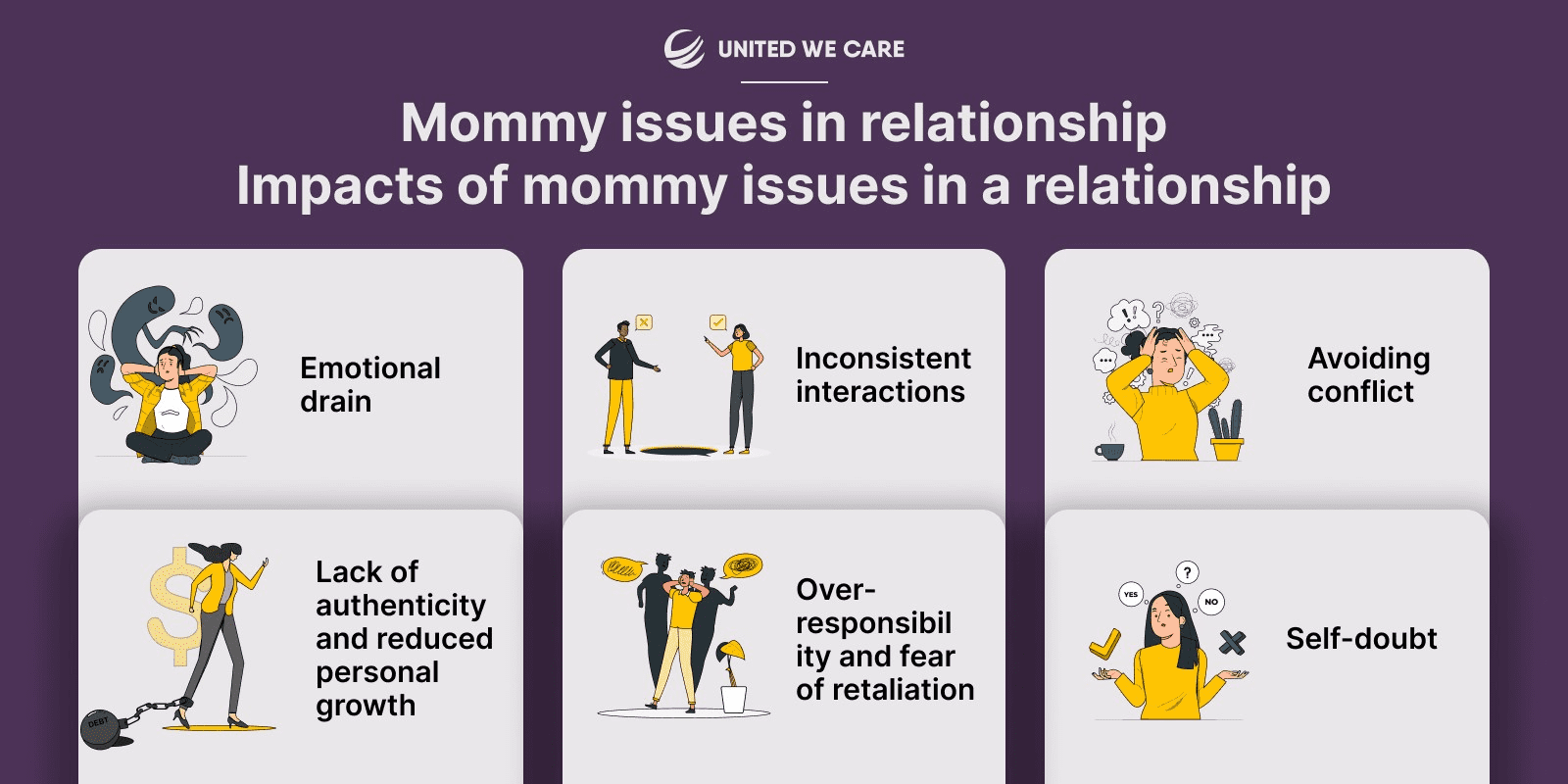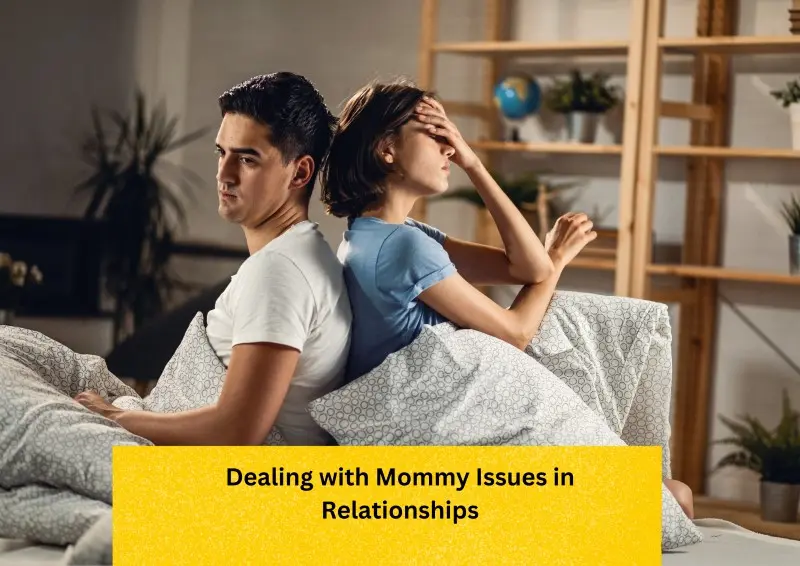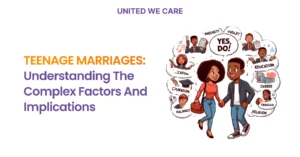Introduction
The kind of relationship our mothers cultivate with us as children sets the tone for all kinds of connections we form lifelong. Having attachment issues with our mother can result in ‘mommy issues’ in relationships.
As children, our mother is the most important figure for us. She is our primary caregiver and is responsible for our social, emotional, and overall development. [1]
An insecure attachment develops if a mother does not provide essential emotional support to the child. This can be in the form of abuse, neglect, abandonment, absence, or enmeshment.
The child, as an adult, develops mommy issues. Having this insecure attachment to our mother as a child can lead to unstable and problematic social and romantic relationships as adults.
What are mommy issues in a relationship?
As children, we form an emotional bond with our mothers. When she is available and responsive to our needs, we develop a secure attachment that helps us feel safe and comfortable to trust other people and form intimate connections throughout our lives.
When she is unable to meet our needs, we develop an insecure attachment. This insecurity can show up in different ways in our social and romantic relationships as we grow up. [2]
Do you have an insecure attachment and mommy issues? Let’s find out.
An anxious attachment is a pattern of sometimes being too smothering and sometimes not being there at all for your people. You fear that people are going to abandon you, especially your partner. You find codependency in a lot of your close relationships.
If you have an avoidant attachment style, you may struggle to form genuine bonds with others. You avoid getting close to people and have a hard time expressing your needs. In fact, you feel others are clingy when they express their emotional needs.
If you either seek extreme closeness or distance in your relationships, you may have a disorganized attachment style.
Read More About Attachment Issues: A Comprehensive Guide
Symptoms of mommy issues in a relationship
The attachment style you develop with your mother can have a lifelong influence on the way you communicate your emotions and needs and deal with conflict in relationships.
If you identify with having an anxious attachment style, you may struggle to trust others, have low self-worth, fear abandonment, and be impulsive, unpredictable, and codependent in relationships.
An avoidant attachment style shows up as not being able to connect with people authentically, fearing rejection, avoiding hard conversations, having difficulty expressing your own needs, and holding space for others when they express theirs.
If you have a disorganized attachment style, you may constantly feel anxious about other people’s intentions and are on the edge of extreme closeness or distance in relationships. You may also have a negative view of yourself, others, and the world [3], and you often expect to be disappointed, rejected, or hurt by others.
Know More About What Causes Mommy Issues in Women?
Impacts of mommy issues in a relationship
Since the root of mommy issues is an insecure attachment, this insecurity shows up in different ways in your relationships with your friends, family, and partner, such as:

- Emotional drain: They might be continuously providing reassurance and helping you navigate your emotional ups and downs. This can make them feel emotionally exhausted, burnt out, and resentful.[4]
- Inconsistent interactions: They might get anxious and hesitant in approaching you due to the unpredictable ways in which you might show up.
- Avoiding conflict: They might avoid confronting you or expressing concerns due to your intense reactions or complete withdrawal. This can also lead to passive-aggressiveness in your relationship.
- Lack of authenticity and reduced personal growth: They might have to prioritize your feelings and needs to maintain the equilibrium of the relationship. This can lead to them not focusing enough on their own needs and aspirations.
- Over-responsibility and fear of retaliation: Especially in your romantic partnership, they might have to cater to your emotional and practical needs excessively, resulting in an unhealthy dynamic. They might hold back on expressing their true feelings and setting boundaries as they fear retaliation from you.
- Self-doubt: They might start second-guessing their perceptions and actions.
Relationships are a two-way street. While you face the impacts of your attachment style, your close one also faces some consequences, and your relationships suffer. There is no need to be harsh with yourself. It is possible to overcome mommy issues and have healthy relationships.
Read More About Difference Between Mommy Issues vs Daddy Issues
How to overcome mommy issues in a relationship
Most of us have a mix of insecure attachment styles. In order to have healthier relationships, you can work towards feeling more secure within yourself and approaching your relationships with the same security. You can do this by:
- Understanding your childhood experiences and resolving your attachment trauma: This can help you consider the impact on your current relationships and break any patterns that are not serving you anymore.
- Improving your communication skills: When you are clear about your feelings and needs, you can openly communicate them to others. Working on your nonverbal communication, such as your posture and eye contact, can also help deepen your relationships.
- Developing relationships with people who have a secure attachment style: Being around such people can help you shift from unhealthy to healthier patterns of thinking and behaving.
- Seeking the help of a mental health professional: Psychotherapy can offer you strategies and insights to navigate challenging relationship dynamics.
- Practicing self-care: Be kind to yourself. Consider yourself a human with flaws who is growing with awareness. Invest your time in activities that help you relax and feel good in your own company. Develop a healthy lifestyle.
Explore Our Self-paced Courses
Conclusion
Insecure attachment with our mother in childhood can affect the way we show up in relationships as adults.
An anxious attachment style can make you fear that others are going to abandon you. This can create codependency in relationships.
An avoidant attachment style can make you want to run away from intimacy and be dismissive of the needs of others. This can create inauthenticity and distance in relationships.
You may find yourself in push-pull dynamics in your relationships with a disorganized attachment style. You may also expect the worst of people and situations without reason.
A dysfunctional dynamic also affects the other person in your relationship. They may end up feeling emotionally drained and overly responsible for your feelings and needs. This can result in inauthentic and inconsistent relationships.
With an awareness and understanding of your attachment style and unhealthy patterns, you can begin to shift to healthier dynamics in your relationships.
Talk To Our Experts
References:
[1] D. Winnicott, “Mirror-role of mother and family in child development 1,” Parent-Infant Psychodynamics, https://www.taylorfrancis.com/chapters/edit/10.4324/9780429478154-3/mirror-role-mother-family-child-development-1-donald-winnicott. [Accessed: Oct. 18, 2023].
[2] K. Levy, PhD & S. Blatt, PhD, “Attachment theory and psychoanalysis: Further differentiation within insecure attachment patterns,” Psychoanalytic Inquiry, https://doi.org/10.1080/07351699909534266. [Accessed: Oct. 18, 2023].
[3] L. Rachel, B. Sandra. V. Filippo & B. Katherine, “The relationship between insecure attachment and paranoia in psychosis: A systematic literature review,” British Journal of Clinical Psychology, https://doi.org/10.1111/bjc.12231. [Accessed: Oct. 18, 2023].
[4] N. Karen, M. Ian & H. David, “You spin me right round: cross-relationship variability in interpersonal emotion regulation,”Frontiers in Psychology,” https://doi.org/10.3389/fpsyg.2012.00394,. [Accessed: Oct. 18, 2023].





